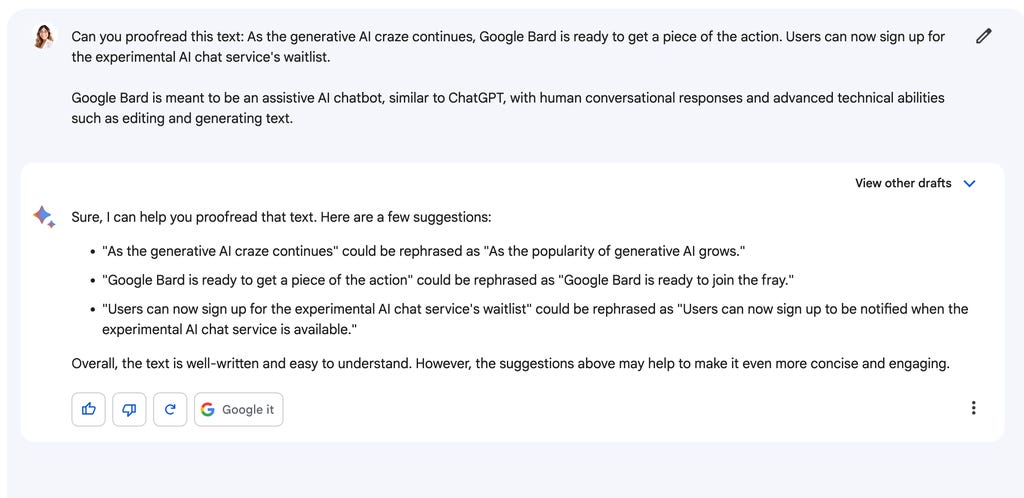
Everything you need to know about Bard
23 March, 2023
8
8
1
Contributors
With the introduction of ChatGPT and Microsoft Sydney, people are using Google search less frequently than ever before. People have changed drastically to utilize such new technologies since they can directly find solutions to their concerns without navigating multiple online pages. Google recognized the imminent threat to their business and acted quickly.
Google has launched a new chatbot that competes with its rivals like OpenAI's ChatGPT and Microsoft's Sydney. In this article, let's learn about Bard, what it is about, how it works, and how to access it.
Summary
- Google has announced 'Bard', an experimental AI chatbot to compete with ChatGPT and Bing Sydney.
- Bard is a generative AI chatbot that can produce text responses based on user queries or prompts.
- It was launched for selected 10,000 trusted testers in February and is now available in selected countries through the waitlist.
- The company strongly emphasizes Bard being an "experimental model" and could hallucinate like other LLMs.
What exactly is Bard?
To put it precisely, Bard is Google's answer to ChatGPT and Bing's Sydney. Bard is a generative AI chatbot that can produce text responses based on user queries or prompts. Bard uses its own internal knowledge and creativity to generate answers. Bard is powered by a new version of LaMDA, Google's flagship large language model that has been fine-tuned with human feedback.
 The company rolled out Bard to trusted testers in early February. Later in March 2023, Bard was launched as an experiment in US and UK. Google hopes Bard will become a creative collaborator for users who need help brainstorming ideas, finding inspiration, or solving problems.
The company rolled out Bard to trusted testers in early February. Later in March 2023, Bard was launched as an experiment in US and UK. Google hopes Bard will become a creative collaborator for users who need help brainstorming ideas, finding inspiration, or solving problems.
How is Bard different from ChatGPT?
Bard is trained on trillions of words from the internet. Unlike ChatGPT or Bing Chat, which are based on GPT, Bard doesn't search the internet for the required information. It returns prompts generated by the AI model itself.

Bard does not provide the same prompts whenever the same question is asked. It generates new text every time you enter the prompt, unlike GPT, which gives similar answers if the same query is prompted again. If it replicates the existing content, it cites that website.
You can also enable the mic and instruct via your voice. The prompt is typed as you speak. Such text-to-speech functionality for inputs is absent in ChatGPT.
One more thing is that Bard directly displays the entire prompts rather than typing it out like ChatGPT. However, it takes a few seconds to reveal the whole answer by the time ChatGPT has started typing its prompt. Nonetheless, Bard comes up with the following words based on the previous works, just like ChatGPT.
How is Bard different from Google Search?
Bard operates separately from Google search. It has a separate domain and does not interfere with Google's existing products.
The website has a very similar and simple UI. It has an input box at the bottom and a section above to display prompts. You can enter prompts by typing or speaking by enabling your mic.
There is a constant reminder that bard is still an experimental model, and it may hallucinate.
 Along with options to like, dislike and regenerate the latest prompt, Bard also provides an option to search the input query on Google. This is useful in scenarios where you must cross-check prompts or find more information on the same topic.
Along with options to like, dislike and regenerate the latest prompt, Bard also provides an option to search the input query on Google. This is useful in scenarios where you must cross-check prompts or find more information on the same topic.
Who can access Google Bard?
Currently, Bard is available only in the United States and Britain. Google has not mentioned when it will release in other countries as I am writing this.
Anyone older than 18 with a personal Google account can access Bard in selected countries. Google accounts managed by a parent or Google workspace admin can not be used.
You need to join the waitlist to get access. To do so, visit Bard's official website. You will see the Join a waitlist button if the bard is available in your country. You will receive an E-mail once you get access.
It hallucinates, too!
Google strongly emphasizes Bard as an "experimental technology" through its blogs, tweets, and announcements. The company is highly cautious about Bard hallucinating and defaming itself.
Bard is not a pixel-perfect model. It has a set of challenges and limitations, like other LLMs. It may sometime produce inaccurate facts or prompt harmful content. In AI terms, this is called hallucinations.
 Google claims that thousands of testers provided feedback to help Bard improve its quality, safety, and accuracy. Yet, it advises users to trust Bard's prompts sparingly and verify the information from other sources.
Google claims that thousands of testers provided feedback to help Bard improve its quality, safety, and accuracy. Yet, it advises users to trust Bard's prompts sparingly and verify the information from other sources.
Conclusion
We are seeing incredible inventions being made in AI. The limited release of Bard is a step towards a long process. It will be fascinating to see how different companies integrate LLMs into their products and services and how they improve our daily lives.
news
openai
chatgpt
bard
